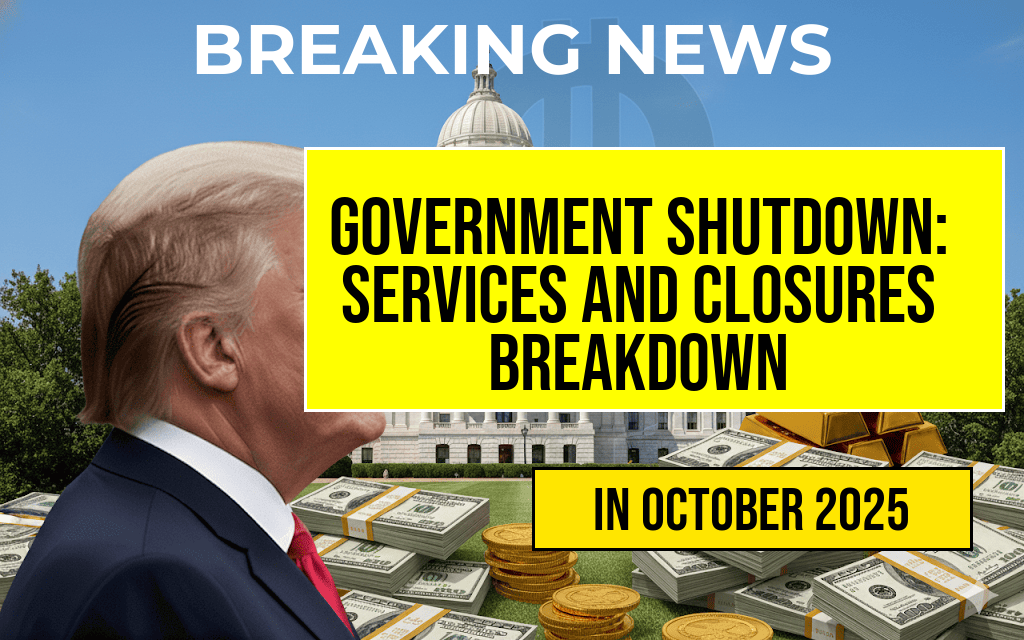The federal government has officially entered a shutdown, affecting numerous agencies and services across the United States. As lawmakers grapple with budget disagreements, many federal operations have paused or scaled back, leaving millions of Americans uncertain about which services remain operational. This shutdown impacts critical functions such as Social Security, the Internal Revenue Service (IRS), the Department of Defense, and the Transportation Security Administration (TSA), among others. While some agencies continue to operate at minimal capacity, others have halted all but essential activities. This article provides a comprehensive, agency-by-agency breakdown of what services are affected, what remains open, and what closures are underway amidst the shutdown, offering clarity on how federal operations are navigating this impasse.
Overview of the Federal Shutdown Timeline and Impact
The government shutdown began after congressional leaders and the President failed to reach an agreement on funding legislation by the deadline. This impasse means that non-essential federal operations are halted, and thousands of federal employees are furloughed or working without pay. The shutdown’s duration hinges on ongoing negotiations, but even short-term closures disrupt daily life for millions and slow down essential government functions.
Essential Services and Operations During the Shutdown
While many federal agencies face closures, certain vital functions are designated as essential and continue to operate to safeguard public safety and national security. These include agencies responsible for law enforcement, national security, air traffic control, and health emergencies. The following sections detail how specific agencies are responding and which services remain available.
Social Security Administration
- Operations Status: The Social Security Administration (SSA) continues to process benefit payments and handle urgent issues related to retirees, disability, and survivors. Most local SSA offices are closed to the public, but phone and online services remain available.
- Impact on Beneficiaries: Beneficiaries should expect delays in in-person visits and some administrative processes. However, direct deposit payments are unaffected.
- Additional Notes: The SSA has indicated that staff will work without pay during the shutdown, but services are maintained for core functions.
Internal Revenue Service (IRS)
- Operations Status: The IRS has limited operations during the shutdown. Most taxpayer assistance centers are closed, and processing of certain tax returns may slow down. However, electronic filing and direct deposit refunds are generally unaffected.
- Tax Filing Deadlines: The deadline for filing taxes remains unchanged, but taxpayers should anticipate potential delays in correspondence and customer support.
- Enforcement Activities: IRS enforcement activities, including audits and collections, are scaled back but may resume if the shutdown prolongs.
Department of Defense
- Operations Status: The Department of Defense (DoD) maintains critical functions such as troop readiness, deployment, and national security operations. Most civilian personnel involved in non-essential activities are furloughed.
- Military Readiness: Active-duty military members continue their duties without pay until Congress approves funding. Some support services, including base services like commissaries and medical facilities, remain open.
- Impact on Civilian Employees: Thousands of civilian employees face furloughs, with some services temporarily suspended.
Transportation Security Administration (TSA)
- Operations Status: TSA continues airport security screenings as usual, ensuring that air travel remains unaffected for the time being.
- Furloughs and Staffing: TSA agents are considered essential personnel and are working without pay, which may lead to increased stress and potential staffing shortages if the shutdown persists.
- Impact on Travelers: Passengers should anticipate normal security procedures but stay informed about potential delays or disruptions due to staffing challenges.
Other Federal Agencies and Notable Closures
| Agency | Status | Key Services Affected |
|---|---|---|
| Environmental Protection Agency (EPA) | Partial shutdown; essential functions continue | Water safety inspections, pollution monitoring |
| Federal Emergency Management Agency (FEMA) | Operational; focus on emergency preparedness | Disaster response, disaster relief coordination |
| National Parks Service | Major closures; limited staff on site | Most national parks and monuments are closed to visitors |
| U.S. Postal Service | Operational; unaffected by shutdown | Mail delivery and retail services continue as usual |
Financial and Economic Implications
The shutdown’s economic toll is already evident in delayed government payments, disrupted services, and decreased consumer confidence. Small businesses relying on federal contracts or services face uncertainties, and government contractors are experiencing delays in payments and project approvals. Financial markets may also react to prolonged budget impasses, adding volatility to the economy.
Public Response and Congressional Negotiations
Lawmakers remain divided on the funding issues, with debates centering around budget allocations for border security, defense, and social programs. While temporary measures have kept some agencies afloat, the prolonged impasse risks further disruption. Citizens are urged to stay informed through official government channels and plan accordingly for potential delays in services.
For ongoing updates and guidance, visit the official Congress.gov and USA.gov.
Frequently Asked Questions
What services are affected by the government shutdown?
The government shutdown impacts various agencies, leading to closures or limited operations. Essential services like Social Security and TSA continue to operate, while non-essential agencies may halt services or reduce staff.
Will I still receive my Social Security payments during the shutdown?
Yes, Social Security payments are considered essential and will continue to be processed and distributed during the government shutdown.
How does the IRS shutdown affect tax filings and refunds?
During the government shutdown, many IRS services, including assistance and processing of certain tax returns, may be delayed or unavailable, potentially impacting refunds and support.
Are Defense operations and personnel affected by the shutdown?
While Defense agencies generally continue essential functions, some non-essential activities and administrative services may be paused, and certain personnel might experience furloughs.
What precautions should travelers take regarding TSA services during the shutdown?
TSA security screening at airports remains operational as it is considered essential. Travelers are advised to arrive early and stay informed about any updates or changes in airport procedures.

Leave a Reply